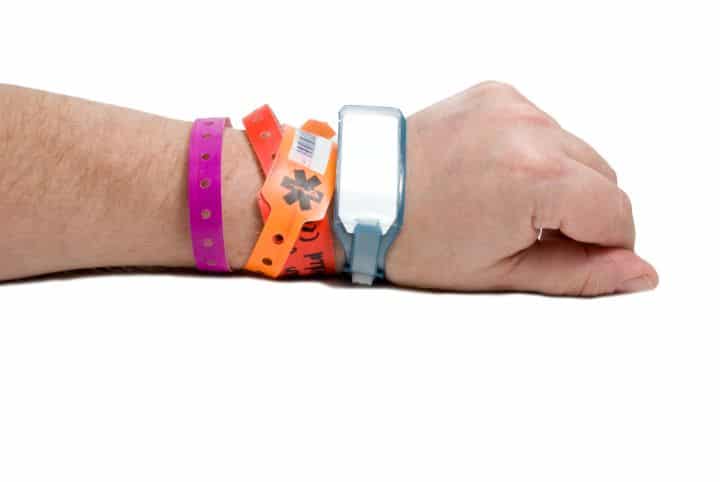A is worn by an individual so that if in case of emergencies, the information contained in the could save their life. To elaborate, this contains information on any medicines the individual uses or the allergies that the patient has the emergency contact person details on it.
A necklace or will guide the doctors to give suitable treatment to you when you are in an unconscious state.
Contents
It is recommended to have medical IDs if you are having any medical condition according to many healthcare and physicians organizations. Wearing a medical ID at all times can provide you and your near ones a sense of relief and peace of mind since if you end up alone in an emergency, the emergency personnel are alerted to your medical condition or history.
It need not necessarily be a , could also be a worn around your neck.
Just imagine, a simple piece of around your neck or wrist can help the be alerted to your condition and in turn prevent misdiagnosis, unwanted drug interaction, or any treatment that might be fatal to you!
As for what all a should contain; an accurate and informative should have conditions like , , and medications. This will help doctors give you the proper treatment right away to help avoid unwanted physical examinations, hospital trips, or unnecessary .
Before we go into , I’d like to take you through the benefits of wearing :
Facilitates an Informative Diagnosis
Your will have the information that your doctors need including your pre-existing conditions, to make a more informed diagnosis. If you’re wearing the , doctors will be able to detect your illness earlier and give you effective treatment as soon as possible. A can help doctors evaluate you faster.
Doctors will be able to treat the right ailments if you have one. A can help the doctor rule out ailments and arrive at the correct diagnosis.
Help Avoid Unwanted Hospital Visits
Imagine that you have epilepsy. Now, imagine that you are out shopping alone, standing in line at the checkout counter and suddenly you have an episode.
When the arrives, they will rush you to the hospital as you’d be unconscious and not in a condition to explain your condition, any possible triggers, or any you may have to certain medications.
On the other hand, if you had a piece of medical alert jewelry on your person, the medical professions can identify your condition and will wait for the seizure to stop.
Afterward, they will just make sure you are conscious and well aware of your surroundings, ensure that everything can be managed independently. This way you can an unnecessary trip to the hospital, saving money and time.
You may also like Best Medical Alert System For Hearing Impaired
Enables Timely, Accurate Bystander Response
Sometimes, you may have to rely on bystanders to help you out of an . In this case, a piece of worn on your person can be invaluable.
The bracelets are written in layman’s language so that anyone can comprehend the individual’s information easily and administer first aid if there are no doctors around yet.
So you know, a does indeed prove immensely useful in many instances.
You may also like Best Activity Tracker For Seniors
Easier Blood Transfusion
If you’ve been in a nasty accident and in need of immediate surgery, it is highly likely that you would need a blood transfusion to compensate for the blood you lost.
The includes information about your which helps the doctors and know which kind of blood to give you.
In addition to that, they will also be able to talk to your doctors since the will give the details of your regular doctor. This will help to administer the medication and treatment which will suit you better.
Now, people with certain conditions ought to wear medical IDs to alert medical professionals in an
So we are moving on to who should wear a bracelet; here is a list of conditions that would make a good reason to wear a :
People with the following conditions:
- Alzheimer’s disease, memory problems
- Asthma, COPD
- Autism
- Blood disorders
- Breathing disorders
- Clinical trial participation
- Diabetes
- Epilepsy/seizure disorders
- Food, drug, and insect allergies
- Heart health issues
- Hearing, visual or mental impairments
- Kidney failure
- Multiple medications
- Rare diseases
- Risk of stroke
- Sickle Cell Anemia
- Transplant surgery
If you have one or more of the medical conditions listed above, you should consider getting a to avoid any disastrous consequences that come in the shape of medical errors in the time of an .
You may also like Best Pulse Oximeter For Elderly
Frequently Asked Questions About :
What are the medical conditions that need to be engraved on the medical alert bracelet?
Take a look at some of the medical conditions that are usually seen on a medical ID:
- Irregular ECG/EKG
- Alzheimer’s disease
- Myasthenia gravis
- Asthma
- Heart valve replacement
- Bleeding disorder
- Dementia
- Stroke
- Hypertension
- Diabetes (insulin-dependent as well as non-insulin-dependent)
- Cardiac arrhythmia
- Sickle cell disease
- Glaucoma
- Hearing impairment
- Laryngectomy
Lupus - Seizure disorder
- Visual impairment
- Renal failure
- Emphysema
- Lymphoma
- Malignant hyperthermia
- Leukemia
- Mental health issues
- Pacemaker or ICD implant
- Hemolytic anemia
You may also like Best Personal ECG Monitor
Should I include a list of medications on my ?
Yes and No!
So the most important thing is that you list out the critical conditions you have, and your .
If you have space left over, you can utilize that space to list out (engrave) prescription medicines taken on a long-term or need basis. This will enable to put you on the correct treatment and will reduce the scope of any medical error and eliminate chances of a drug interaction.
Here are some classes of medicines that are usually seen on a medical ID:
- Analgesics: including many narcotics
- Anticoagulants: commonly known as blood thinners
- Anticonvulsants: used for seizure disorders like Epilepsy
- Antihistamines, Decongestants: these are prescription or over-the-counter medicines for allergies
- Blood pressure medicines
- Beta-Blockers: these are drugs that are used to slow the heart rate
- Cardiac medicines: including ones for angina or atrial fibrillation
- Chemotherapy agents: medicines for treating cancer or serious infectious diseases
- Steroids
What information should I engrave on my ?
List only medical conditions that should be known in an .
Each style allows a different amount of information to be engraved. If you have multiple conditions that could prove fatal in an emergency, we suggest that you opt for wider bracelets that can accommodate the amount of info, and choose to engrave both sides of the ID.
You can also engrave “See wallet card” and list more information there than can fit on your ID.
For instance, you may have a long-standing condition that requires medication, but if that medication is changed frequently, you could opt to list them on a wallet card or handbag card and keep it at all times on your person.
All you need to engrave on your medical alert ID is “See Wallet Card”.
Summarize your blood type information in short words. Remember to list any blood-thinning condition if it exists.
Only medicines taken on a long-term basis should be engraved on a . Take care to list the most important medicines first.
Do look at my ?
Now, allow us to delve into some statistics:
A person’s medical condition is the primary and important information that will help in administering the right treatment for the patient.
According to multiple online reports, it is clear that 95% of responders who arrive at the scene of an emergency check for .
If you wear a it will help in preventing any treatment or unwanted drug interaction that won’t suit your medical condition. Also, the chance of misdiagnosis is very less.
For instance, if you are an individual with high blood pressure, the emergency responders know they ought to check your and monitor your in general until you’re conscious and able to manage on your own again.
They know that you would be on certain medications for high blood pressure (which should ideally be engraved on the medical alert ID or on your wallet card) and that they need to be cautious of drug interactions.
You may also like Best Health Monitor Watches for Seniors
When should I wear my bracelet?
The short answer- Always!
You should always wear your . In case you are going out alone, or even staying inside the home unaccompanied, the medical alert tag could come in mighty useful in case of an unexpected disaster.
The purpose of the medical alert jewelry is to be of use in an emergency where you may be unconscious or unfit to communicate about the condition of your mental and physical health. If you take it off, it can’t help you in an unexpected .
Invest in a good quality medical alert bracelet or necklace which can safeguard your life in case of a potential disaster.
We hope that this article has been beneficial to you with your queries on a medical alert bracelet. Do let us know your experience in the comments below!



